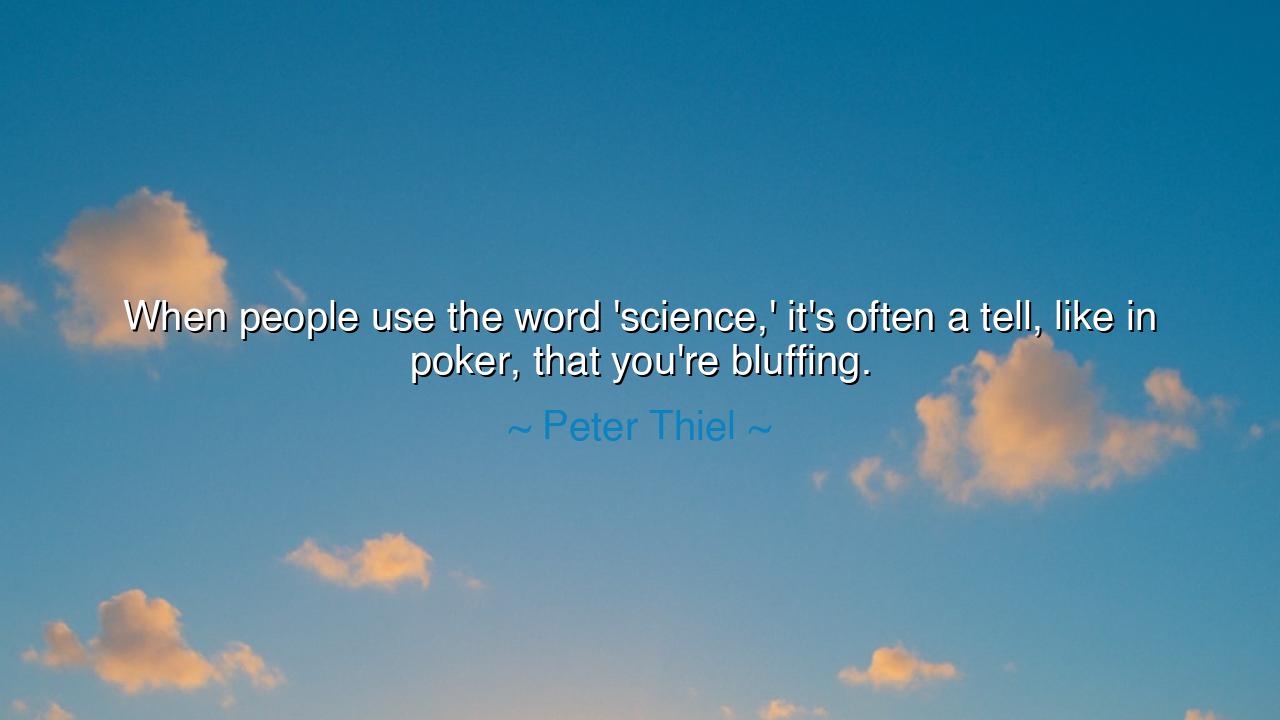
When people use the word 'science,' it's often a tell, like in
When people use the word 'science,' it's often a tell, like in poker, that you're bluffing.






Listen, O Seekers of Truth, to the words of Peter Thiel, who speaks not merely of science, but of the art of truth-seeking and the dangers of deception hidden behind the guise of certainty. "When people use the word 'science,' it's often a tell, like in poker, that you're bluffing." In these words, Thiel reveals a deep insight into the way knowledge is often wielded as a weapon, a shield to cover up ignorance or falsehood. In the grand dance of human discovery, we are often confronted by those who claim to know, to hold the truth, only to have it exposed as a bluff, a mask hiding their true intentions or lack of understanding. Science, the great tool for uncovering the mysteries of the world, is sometimes used not to illuminate the truth, but to obscure it.
Consider, O Seekers, the ancient philosophers who, in their search for wisdom, warned of the dangers of false knowledge. Socrates, that wise teacher of Athens, spent his life uncovering the flaws in the claims of those who prided themselves on their knowledge. He would often say, "I know that I am wise because I know that I know nothing." His method of questioning and dialogue was not merely to prove others wrong, but to reveal the truth that lay hidden beneath the layers of pretension. Just as Socrates sought to expose the false claims of the so-called wise men of his day, so too does Thiel’s words speak to a danger in our time—the tendency to hide behind science when it is used not to reveal the truth, but to maintain a false authority.
In the same way, Thiel’s words point to a fundamental truth: that the use of science should be a pursuit of understanding, not a tool of manipulation. There are many who, when faced with questions they cannot answer, invoke the power of science to create an illusion of certainty. This is the bluff—the claim to know without truly understanding, the pretense of authority without the substance of truth. Just as in the game of poker, where a "tell" reveals a bluff, so too can the use of science as a shield expose a deeper insecurity or lack of genuine knowledge.
Let us recall the example of Galileo Galilei, who, when confronted with the geocentric view of the universe—a belief held by many of the most respected scholars of his time—did not simply accept the authority of the establishment. He dared to use the tools of science, the telescope, and observation, to question the world that was thought to be known. Galileo’s discoveries shattered the false authority of the Church and the scientific consensus of his time, revealing a new truth about the universe. He did not rely on the bluff of accepted knowledge, but on the rigorous pursuit of evidence. His story teaches us that true science is not about hiding behind what we claim to know, but about asking questions, seeking evidence, and embracing uncertainty in the face of unanswered questions.
In contrast, consider the many charlatans throughout history who have cloaked their deceptions in the garb of science. Whether in the form of pseudoscience, quackery, or the manipulation of data, these false claims thrive on the blind trust people place in the authority of science. We have all witnessed, O Seekers, the use of science as a mask, a way to avoid scrutiny, to avoid the questions that would expose the truth beneath the surface. Thiel’s words are a warning against those who would use the prestige of science as a weapon to maintain power, control, or profit—those who bluff, who claim knowledge they do not possess, all while pretending to hold the key to truth.
The lesson, O Seekers, is clear: science is not an instrument to shield our ignorance, but a tool to uncover the truth. True knowledge is not afraid of questioning or doubt; it welcomes it as the very path to deeper understanding. Whether in science, philosophy, or life, we must remain vigilant against the bluffers, those who seek to wield knowledge not to enlighten, but to deceive. Let us not be swayed by those who use the language of science as a smokescreen for their own agenda, but instead seek the truth that is born from honest inquiry and the willingness to confront the unknown.
So go forth, O Seekers, with the understanding that knowledge must never be used to deceive, to cover up our ignorance, or to manipulate others. In the pursuit of truth, let us be like the great philosophers and scientists who came before us—those who questioned, who challenged authority, and who sought truth not for personal gain, but for the betterment of humanity. In all things, let your pursuit of knowledge be driven by the desire to illuminate, to understand, and to reveal the world as it truly is, free from the bluffs that seek to hide the truth.






AAdministratorAdministrator
Welcome, honored guests. Please leave a comment, we will respond soon